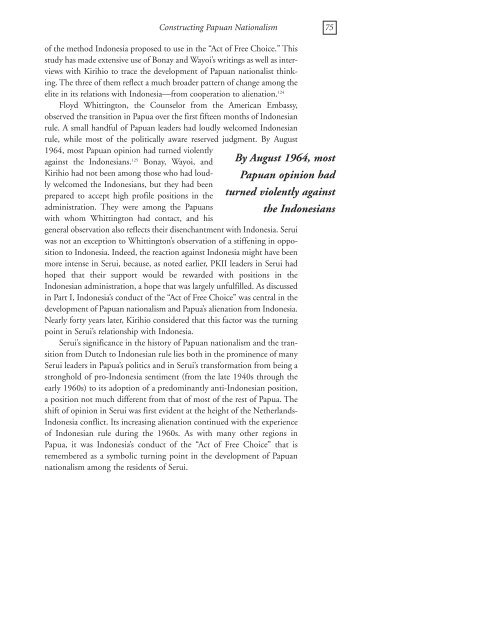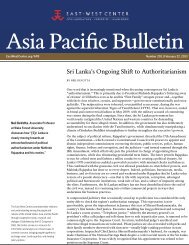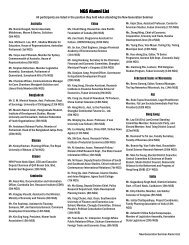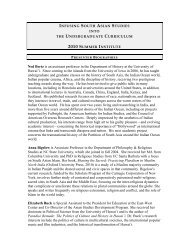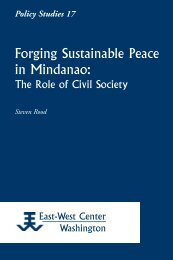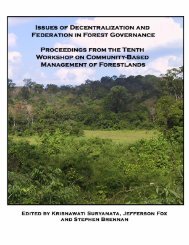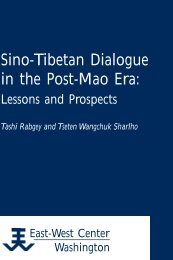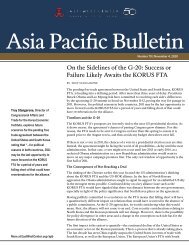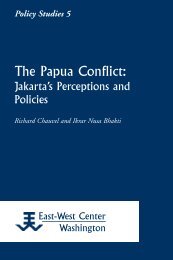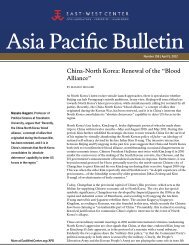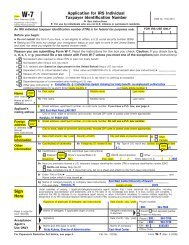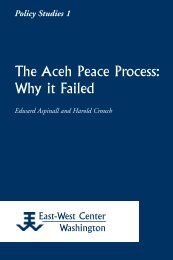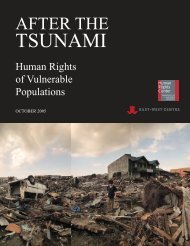Constructing Papuan Nationalism: History, Ethnicity ... - ScholarSpace
Constructing Papuan Nationalism: History, Ethnicity ... - ScholarSpace
Constructing Papuan Nationalism: History, Ethnicity ... - ScholarSpace
- No tags were found...
Create successful ePaper yourself
Turn your PDF publications into a flip-book with our unique Google optimized e-Paper software.
<strong>Constructing</strong> <strong>Papuan</strong> <strong>Nationalism</strong> 75of the method Indonesia proposed to use in the “Act of Free Choice.” Thisstudy has made extensive use of Bonay and Wayoi’s writings as well as interviewswith Kirihio to trace the development of <strong>Papuan</strong> nationalist thinking.The three of them reflect a much broader pattern of change among theelite in its relations with Indonesia––from cooperation to alienation. 124Floyd Whittington, the Counselor from the American Embassy,observed the transition in Papua over the first fifteen months of Indonesianrule. A small handful of <strong>Papuan</strong> leaders had loudly welcomed Indonesianrule, while most of the politically aware reserved judgment. By August1964, most <strong>Papuan</strong> opinion had turned violentlyagainst the Indonesians. 125 Bonay, Wayoi, andKirihio had not been among those who had loudlywelcomed the Indonesians, but they had beenprepared to accept high profile positions in theadministration. They were among the <strong>Papuan</strong>swith whom Whittington had contact, and hisgeneral observation also reflects their disenchantment with Indonesia. Seruiwas not an exception to Whittington’s observation of a stiffening in oppositionto Indonesia. Indeed, the reaction against Indonesia might have beenmore intense in Serui, because, as noted earlier, PKII leaders in Serui hadhoped that their support would be rewarded with positions in theIndonesian administration, a hope that was largely unfulfilled. As discussedin Part I, Indonesia’s conduct of the “Act of Free Choice” was central in thedevelopment of <strong>Papuan</strong> nationalism and Papua’s alienation from Indonesia.Nearly forty years later, Kirihio considered that this factor was the turningpoint in Serui’s relationship with Indonesia.Serui’s significance in the history of <strong>Papuan</strong> nationalism and the transitionfrom Dutch to Indonesian rule lies both in the prominence of manySerui leaders in Papua’s politics and in Serui’s transformation from being astronghold of pro-Indonesia sentiment (from the late 1940s through theearly 1960s) to its adoption of a predominantly anti-Indonesian position,a position not much different from that of most of the rest of Papua. Theshift of opinion in Serui was first evident at the height of the Netherlands-Indonesia conflict. Its increasing alienation continued with the experienceof Indonesian rule during the 1960s. As with many other regions inPapua, it was Indonesia’s conduct of the “Act of Free Choice” that isremembered as a symbolic turning point in the development of <strong>Papuan</strong>nationalism among the residents of Serui.By August 1964, most<strong>Papuan</strong> opinion hadturned violently againstthe Indonesians


